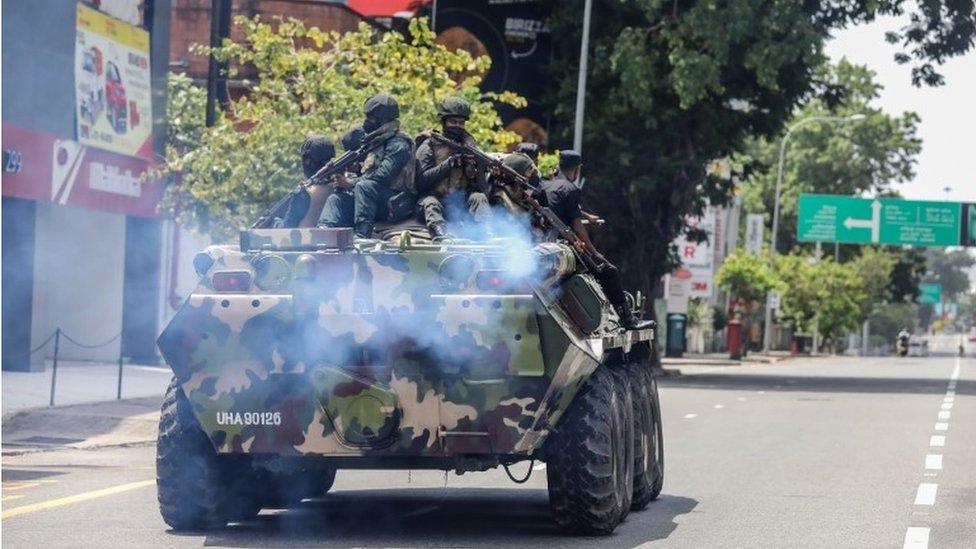Sri Lanka President Gotabaya Rajapaksa confirms resignation, PM's office says
- Published
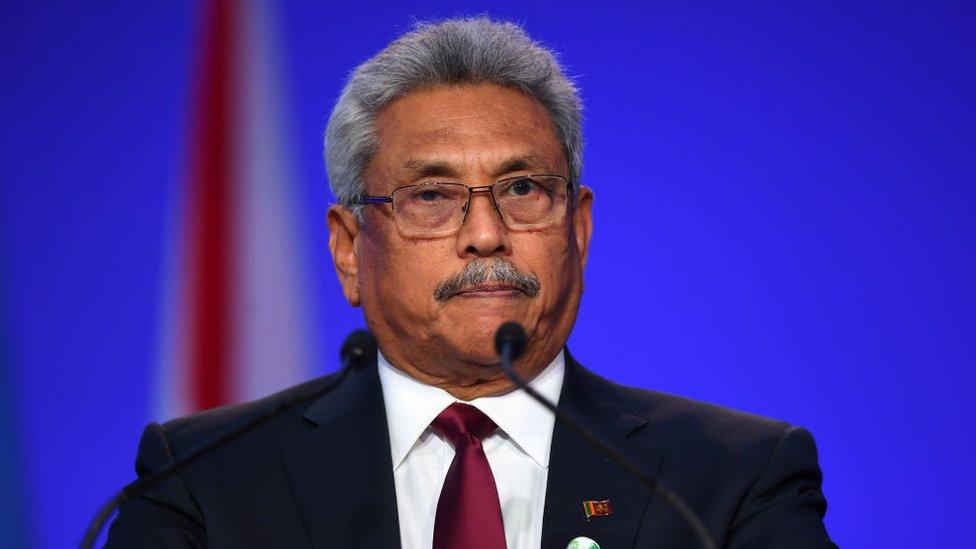
Mr Rajapaksa's location is currently undisclosed
Sri Lankan President Gotabaya Rajapaksa has confirmed he will resign, the prime minister's office has said, after tens of thousands of protesters stormed the official residences of both men.
Sri Lanka is in deep financial crisis and the crowds say they won't leave until both men quit their posts.
The parliament Speaker had earlier said the president would resign on 13 July.
Mr Rajapaksa, whose whereabouts are unknown, has not spoken publicly since his residence was stormed on Saturday.
He was moved to safety before protesters entered the presidential palace.
Watch: Protesters storm Sri Lankan president's palace in Colombo, swam in the pool and set the PM's house on fire
The president has been blamed for the country's economic mismanagement, which has caused dire shortages of food, fuel and medicine for months. His resignation was first announced by the parliament Speaker on Saturday, but many Sri Lankans responded with scepticism to the idea that he would relinquish power.
On Monday, Prime Minister Ranil Wickremesinghe's office said in a statement it had been informed by Mr Rajapaksa that he would step down on Wednesday.
But under Sri Lanka's constitution, his resignation can only formally be accepted when he resigns by letter to the Speaker - which has yet to happen.
Prime Minister Wickremesinghe had earlier also said he would step down from his position. His house was set on fire during Saturday's unrest.

People power push to oust president
Anbarasan Ethirajan, BBC News, Colombo
At the president's office in Colombo a huge queue stretches to the end of the road as thousands of people wait to see how their rulers have been operating.
Men, women, children are all going to inside to have a look.
The president's residence is one of the symbols of power in this country and one of the most protected buildings.
These people believe that they have won - that people power has triumphed in ousting the president and prime minister from power.
But those things haven't happened yet - even though the president has indicated that he will step down on Wednesday. Unless he resigns formally, it is going to be a long, drawn-out battle.
Read more from Anbarasan - Inside the palace full of Sri Lankans

Inside the occupied palace on Sunday, protesters were refusing to budge until the president leaves.
"I feel sad," said Nirosha Sudarshini Hutchinson, who was visiting the compound with her two teenage daughters.
"A man who was elected president in democratic way had to leave in such a shameful way. We are now ashamed of voting for him."
Other politicians in Sri Lanka met on Sunday to discuss how to handle a smooth transition of power.
The speaker of Sri Lanka's parliament told the BBC World Service Newshour programme a new cross-party coalition government would need to be formed within a week of the president officially stepping down.
"The next couple of days are going to be extremely uncertain times as to see what transpires politically," political analyst and human rights lawyer Bhavani Fonseka told Reuters news agency, adding that it would be interesting to see if the two leaders "actually resign".

Sri Lanka: The basics
Sri Lanka is an island nation off southern India: It won independence from British rule in 1948. Three ethnic groups - Sinhalese, Tamil and Muslim - make up 99% of the country's 22 million population.
One family of brothers has dominated for years: Mahinda Rajapaksa became a hero among the majority Sinhalese in 2009 when his government defeated Tamil separatist rebels after years of bitter and bloody civil war. His brother Gotabaya, who was defence secretary at the time, is the current president but says he is standing down.
Presidential powers: The president is the head of state, government and the military in Sri Lanka but does share a lot of executive responsibilities with the prime minister, who heads up the ruling party in parliament.
Now an economic crisis has led to fury on the streets: Soaring inflation has meant some foods, medication and fuel are in short supply, there are rolling blackouts and ordinary people have taken to the streets in anger with many blaming the Rajapaksa family and their government for the situation.

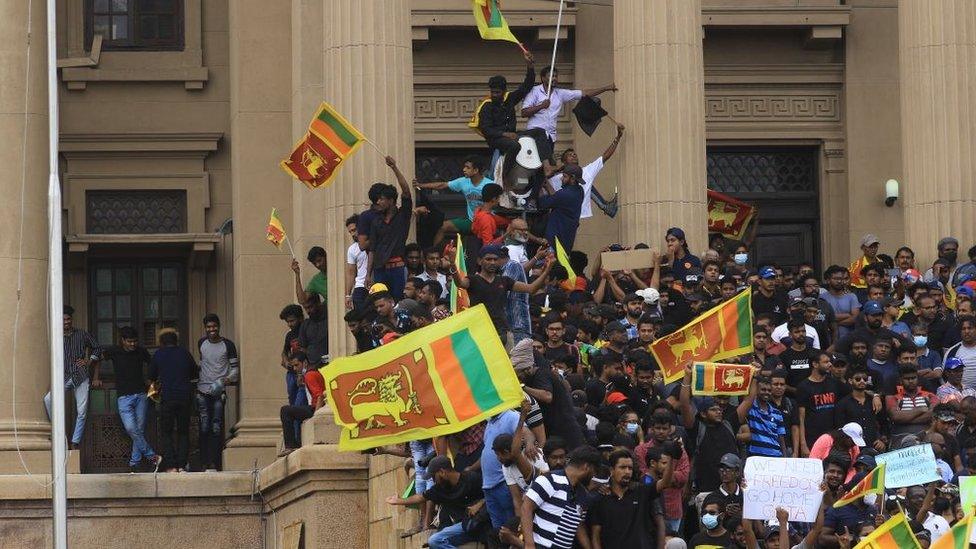
Protesters made their way into the house, chanting slogans and waving the national flag on Saturday
The palace storming on Saturday was the culmination of months of mainly peaceful protests in Sri Lanka at the soaring cost of living and shortages of essentials.
Huge crowds converged on the official residence of President Rajapaksa, chanting slogans and waving the national flag before breaking through the barricades and entering the property.
Footage online showed people roaming through the house and swimming in the president's pool, while others emptied out a chest of drawers, picked through the president's belongings and used his luxurious bathroom.
Mr Rajapaksa vacated his official residence on Friday as a safety precaution ahead of the planned protests, two defence ministry sources said, according to Reuters.
Although it is Mr Rajapaksa's official residence, he usually sleeps at a separate house nearby. His brother, former Prime Minister Mahinda Rajapaksa, is at a naval base in the country, the sources say.
Related topics
- Published8 July 2022
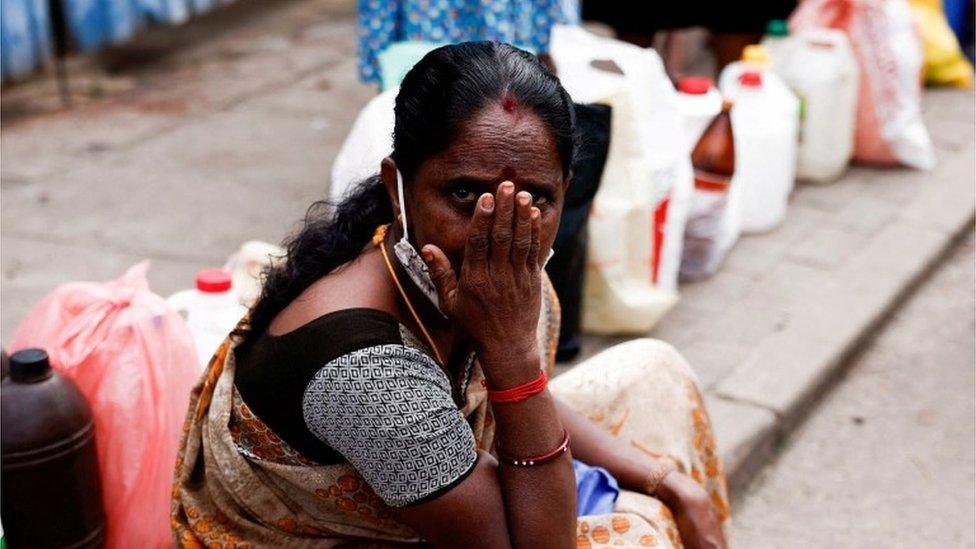
- Published29 March 2023
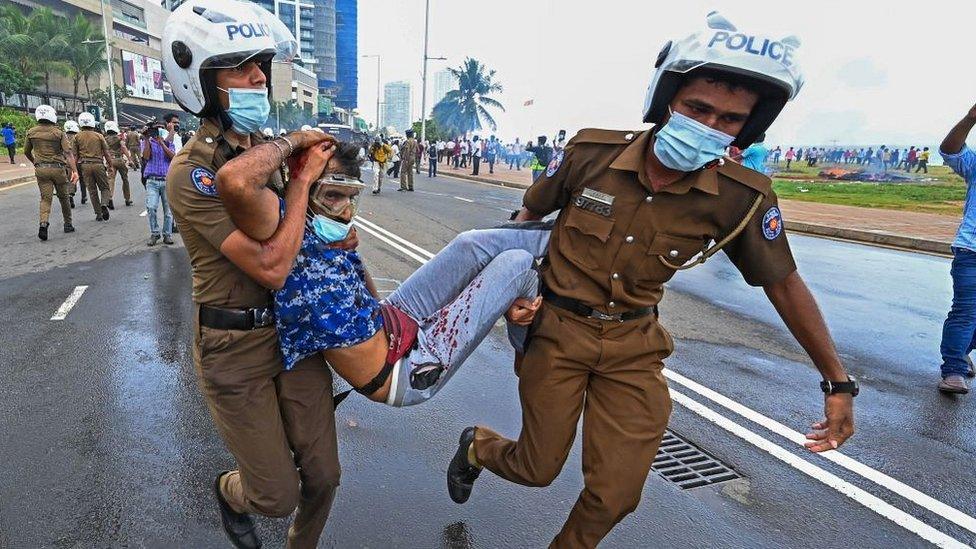
- Published13 May 2022
